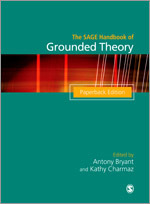The SAGE Handbook of Grounded Theory
Paperback Edition
- Antony Bryant - Leeds Beckett University, UK, Professor of Informatics at Leeds Beckett University, UK
- Kathy Charmaz - Sonoma State University
Antony Bryant & Kathy Charmaz bring together leading researchers and practitioners of the method from the US, the UK, Australia and Europe to represent all the major standpoints within Grounded Theory, demonstrating the richness of the approach. The contributions cover a wide range of perspectives on the method, covering its features and ramifications, its intricacies in use, its demands on the skills and capabilities of the researcher and its position in the domain of research methods.
The SAGE Handbook of Grounded Theory is an indispensable reference source for academics and researchers across many disciplines who want to develop their understanding of the Grounded Theory method.
Tony Bryant and Kathy Charmaz are the perfect editors for this excellent and forward looking Handbook which is surely destined to be a classic
David Silverman
Professor Emeritus, Goldsmiths College
For anyone interested in grounded theory this is a must have book. No longer will students have to search the library or internet to find authoritative voices on a variety of topics. It’s all right there at their fingertips
Juliet Corbin
San José State University
In my experience of supervising and examining masters and doctoral
students in the social sciences over three decades, a very large proportion
of them use or claim to use grounded theory in some form or other. It
appears to be the stock method of social science research and accepted
without question by most university teachers and authorities (let alone
students) in this field....This Handbook, at over 600 pages long, with 27 chapters (in addition to the chapter length Introduction) by more than 30 contributors, offers a vast amount of
material upon which to consider some fundamental issues...There is a very
useful ‘Discursive Glossary of Terms’ and (what a gem!) a thorough and detailed index
John Pratt
Higher Education Review
The Sage Handbook of Grounded Theory constitutes a fascinating col-lection, and the containment of each chapter makes it very amenable to ‘occasional dips’...as a cornucopia of ideas in to the world of grounded theory (which is, apparently, the most frequently-cited analytical approach in qualitative research publications), this volume is unsurpassed
Amanda Holt
Qualitative Research
This handbook brings together the comprehensive range of perspectives that new researchers are looking for. It is very well edited, and communicates ideas and arguments extremely well.
An excellent must have book for postgraduate especially PhD students wanting to use or using Grounded Theory methodology.
Dr. Parveen Ali, University of Sheffield
Excellent all round book that is very useful for the fundamentals of grounded theory. I will recommend this book to my dissertation students, however it is not a book that i can adopt as it will only used by specific students who are looking at Ground Theory
Excellent, clearly written textbook to support qualitative data analysis approaches. Interprets grounded theory for the 21st century.
Excellent text for those using grounded theory in their dissertations. This is an essential read.
Recommended to Master students and course - still in evaluation.
This is a very good introduction to the use, history and nuances of this methodological approach.
Very good, relevant and interresting book
A must read for all students and academics that consider using grounded theory in their research projects.








